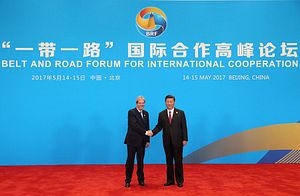Although China’s high-level Belt and Road summit concluded in Beijing two weeks ago, the debate it has generated will continue for quite a while — especially in countries like the United States, where attitudes toward the initiative are ambivalent at best.
To be fair, the United States did send a high-level delegation, led by Matt Pottinger, special assistant to the president and senior director for East Asia at the National Security Council. Pottinger showed a supportive attitude toward the Belt and Road Initiative (BRI) by saying that U.S. firms would be interested in joining Belt and Road projects. Of course, Pottinger also mentioned some of the usual concerns about the BRI, such as transparency, debt burdens, and environmental issues.
The U.S. government’s stance on the BRI is not without its critics in the U.S. domestic arena, however. Critics believe that President Donald Trump is making unnecessary concessions to the Chinese side because of his transactional approach to global affairs, particularly because Trump needs China’s help on the North Korean nuclear issue.
Some strategists tend to believe that the Belt and Road Initiative is more of a grand geopolitical strategy rather than a mere trade and development initiative. Convinced that China will use the BRI to expand its geopolitical influence around the world, some American strategists worry about Trump’s conceding global leadership to China.
Such a view, though understandable from a narrow national interest point of view, is wrong for three reasons.
First, there is no strategic competition between China and the United States when it comes to the Belt and Road countries. Most of the countries along the land and maritime silk roads are far away from the United States, thus rendering any direct competition and even confrontation between Chinese and U.S. interests implausible.
Take Central Asia, for example. Even if China’s economic and political influence is increasing in the Central Asian region, it does not necessarily mean that U.S. influence is declining, as it already maintains close ties with many of the regional players there. If anything, one might argue that it is Russia who should be more concerned about China’s rising influence in Central Asia, which traditionally speaking is within Russia’s sphere of influence.
It is the same in Southeast Asia, where U.S. interests and Chinese interests do overlap to a certain degree. It is tempting to argue that the United States and China can easily clash here due to overlapping and conflicting interests. But so far, China and the United States have been very careful not to engage in serious strategic competition, with the belief that any conflict between the two powers could destroy the region’s prosperity and peace for decades to come.
Second, as Pottinger correctly pointed out, U.S. firms can find some good opportunities in Belt and Road projects, which include infrastructure, financing, environmental, and even energy initiatives. The United States is a leading power in energy and financial services, so U.S. firms should have advantages in Belt and Road projects so long as these projects are open, transparent, and give equal access to all foreign firms.
At a time when the U.S. economy is slowly recovering and suffers from a lack of domestic demand, a “going abroad” strategy would provide more stimulus to the sustainable growth of the U.S. economy. Moreover, U.S. domestic infrastructure projects can be improved by embracing Chinese firms and capital, provided they follow U.S. domestic investment and environmental rules.
Third, U.S.-China relations can be further improved and strengthened with U.S. participation in the Belt and Road Initiative. It is understandable that some in the United States would always be concerned about the grand strategy part of the BRI, no matter how China explains and implements the project; it is, however, important to focus on the positive effects of the Belt and Road projects on the overall picture of U.S.-China relations.
By joining the projects, the United States would actually be in a better position to monitor China’s practices and offer constructive criticisms, all of which in the long run would only make the initiative more effective and transparent. Much like the Asian Infrastructure Investment Bank episode, the initial negative reaction from the U.S. side later turned out to be unnecessary and unconstructive. This time let us hope Washington does not make the same mistake again with regard to the BRI.
All in all, the United States can benefit hugely by participating in the Belt and Road Initiative and, as a consequence, we could expect a more mature and healthier U.S.-China relationship, which is critical for a stable, peaceful, and prosperous Asia.
































